
June 26, 2024
Mineral Turpentine Oil: From Traditional to Emerging Applications
Mineral Turpentine Oil (MTO), also known as white spirit or turpentine substitute, is a versatile petroleum-derived solvent that has been widely used for decades in various industries. This clear, colorless liquid has a characteristic odor and is composed mainly of aliphatic and alicyclic hydrocarbons. Over the years, MTO has evolved from its traditional applications to emerging uses that cater to the changing needs of the market.
Basic Property
Mineral turpentine oil exists as a liquid at room temperature. It’s typically colorless or has a faint pale yellow hue. The defining characteristic of this oil is its strong, pine-like odor. Despite being slightly less dense than water (around 0.85 g/cm³), it’s insoluble in water. However, it readily mixes with most organic solvents like alcohols, ketones, and esters. This property makes it a valuable solvent for various applications. Another key feature is its low viscosity, which translates to a free-flowing liquid. A significant safety concern is its high flammability. Mineral turpentine oil has a low flash point, meaning it can easily ignite at around 40°C (104°F). Therefore, proper handling and storage precautions are crucial when working with this material.
Traditional Applications of Mineral Turpentine Oil
Paint and Varnish Thinning: One of the most common traditional uses of MTO is as a solvent for oil-based paints and varnishes. It helps to thin these coatings, making them easier to apply and clean up. MTO is used to thin oil-based paints and varnishes, making them easier to apply and ensuring a smooth finish. MTO is used as a thinner or reducer in paint formulations
Brush Cleaning: MTO is effective in cleaning brushes and other painting tools used with oil-based paints and varnishes.
Adhesive Removal: Due to its strong solvent properties, MTO can be used to remove adhesive residue and other stubborn stains from surfaces.
Industrial Cleaning: In the metalworking industry, MTO is often used to clean machinery, equipment, and remove oil and grease from parts. It helps to remove oils and greases from metal surfaces. In the electronics industry, MTO is used for precision cleaning of components, circuit boards, and sensitive equipment. MTO is used in the dry cleaning of cloths, effectively removing dirt and stains without damaging the fabric.
Production of Cleaning Products: MTO serves as a solvent in the manufacturing of certain types of cleaning products, such as degreasers and heavy-duty cleaners.
Production of various material: MTO is used in the manufacturing of rubber products, such as tires, belts, and hoses, to improve the quality and performance of the final product. MTO is a traditional raw material used in the production of alkyd resins.
Fragrance Industry: MTO can be used as a carrier solvent in the production of fragrances and perfumes. It helps dissolve and blend fragrance oils and other aromatic compounds, ensuring uniform distribution and stability in the final product.
Emerging Applications of Mineral Turpentine Oil
Wood Primer Manufacturing: MTO is extensively used in the production of wood primers, which are crucial for preparing wood surfaces before painting or varnishing. The demand for wood primers is expected to grow, particularly in the construction and furniture industries.
Odorless MTO for Construction: There is an increasing preference for odorless MTO in large-scale construction projects, such as the development of residential structures, commercial complexes, and government buildings.
Odorless MTO is used as a wood primer and paint thinner in these applications.
Sustainable Alternatives: As the focus on sustainability grows, there is a rising demand for eco-friendly alternatives to traditional solvents. Researchers are exploring ways to produce MTO from renewable sources, such as biomass or waste materials, through processes like pyrolysis or gasification. These bio-based MTO formulations offer reduced environmental impact and align with the principles of a circular economy.
Emerging Markets: The rapid expansion of the paints and coatings industry in emerging markets, such as India, is expected to drive the demand for MTO. Manufacturers are investing in increasing their production capacity or forming strategic alliances to meet the anticipated rise in demand.
Specialized Applications: MTO is finding applications in specialized fields, such as the production of certain types of medicinal products (e.g., cough syrups and vapor rubs) and personal care items.
Emerging Trends and innovation in Mineral Turpentine Oil
Mineral Turpentine Oil (MTO) has been a staple solvent in various industries for decades, but recent trends and innovations are reshaping its role towards sustainability and environmental responsibility. This section explores new applications and innovations in MTO, focusing on bio-based alternatives, sustainable sourcing, reformulation efforts to reduce VOC emissions, and its role in green chemistry initiatives.
Bio-based Alternatives and Sustainable Sourcing Trends
Bio-based MTO: There is growing interest in developing bio-based alternatives to traditional MTO derived from petroleum sources. Bio-based MTO is typically sourced from renewable feedstocks such as biomass, agricultural residues, or even waste materials. These alternatives aim to reduce dependency on fossil fuels and lower the carbon footprint associated with MTO production.
Sustainable Sourcing Practices: Manufacturers are increasingly adopting sustainable sourcing practices for traditional MTO. This includes sourcing raw materials from responsibly managed forests and implementing efficient extraction and processing methods to minimize environmental impact. Sustainable sourcing ensures long-term availability of MTO while preserving biodiversity and ecosystem health.
As the industry continues to evolve, the role of Mineral Turpentine Oil is expanding to meet the growing demand for efficient, safe, and environmentally friendly solvents. By leveraging its versatility and adapting to emerging trends, MTO remains an essential component in various industries, contributing to the development of innovative products and sustainable solutions.


